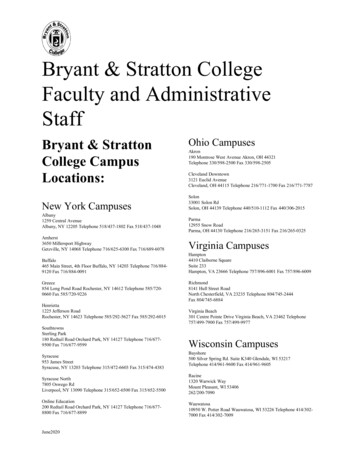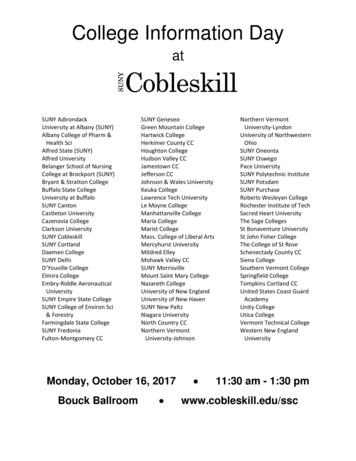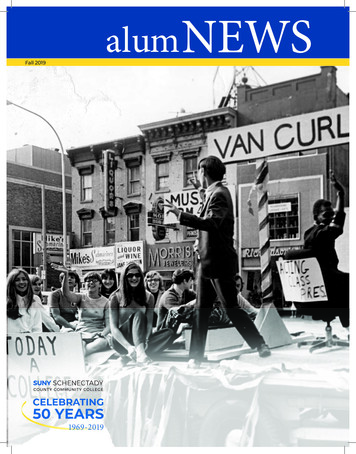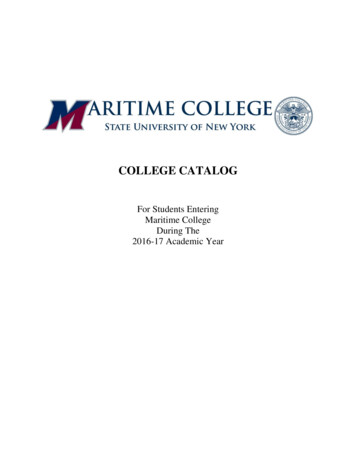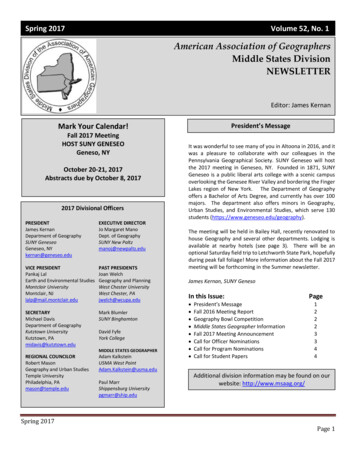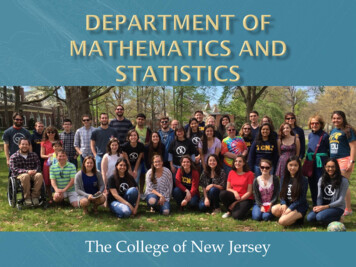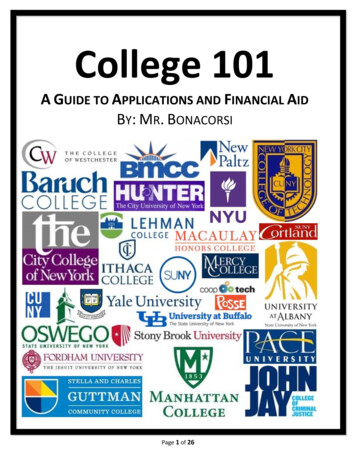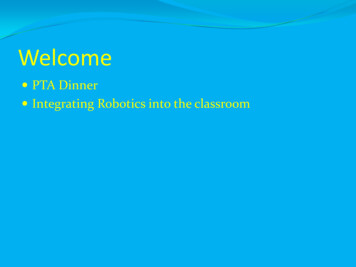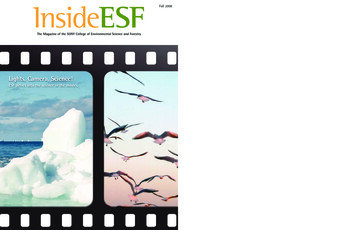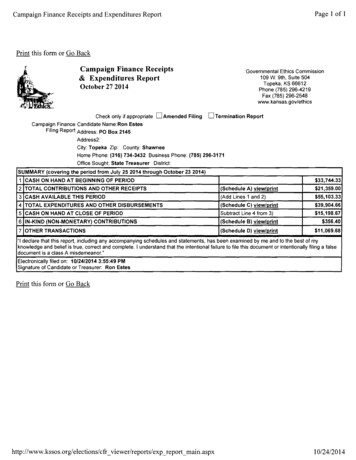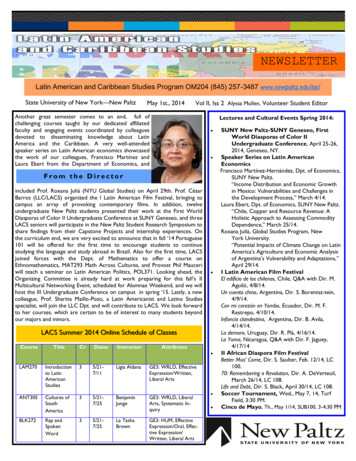
Transcription
NEWSLETTERLatin American and Caribbean Studies Program OM204 (845) 257-3487 www.newpaltz.edu/las/State University of New York—New PaltzMay 1st., 2014Vol II, Iss 2 Alyssa Mullen, Volunteer Student EditorAnother great semester comes to an end, full ofchallenging courses taught by our dedicated affiliatedfaculty and engaging events coordinated by colleaguesdevoted to disseminating knowledge about LatinAmerica and the Caribbean. A very well-attendedspeaker series on Latin American economics showcasedthe work of our colleagues, Francisco Martínez andLaura Ebert from the Department of Economics, andLectures and Cultural Events Spring 2014: From the Directorincluded Prof. Roxana Juliá (NYU Global Studies) on April 29th. Prof. CésarBarros (LLC/LACS) organized the I Latin American Film Festival, bringing tocampus an array of provoking contemporary films. In addition, twelveundergraduate New Paltz students presented their work at the First WorldDiasporas of Color II Undergraduate Conference at SUNY Geneseo, and threeLACS seniors will participate in the New Paltz Student Research Symposium toshare findings from their Capstone Projects and internship experiences. Onthe curriculum end, we are very excited to announce that in fall ‘14 Portuguese101 will be offered for the first time to encourage students to continuestudying the language and study abroad in Brazil. Also for the first time, LACSjoined forces with the Dept. of Mathematics to offer a course onEthnomathematics, MAT293 Math Across Cultures, and Provost Phil Mauceriwill teach a seminar on Latin American Politics, POL371. Looking ahead, theOrganizing Committee is already hard at work preparing for this fall’s IIMulticultural Networking Event, scheduled for Alumnae Weekend, and we willhost the III Undergraduate Conference on campus in spring ‘15. Lastly, a newcolleague, Prof. Sharina Maillo-Pozo, a Latin Americanist and Latino Studiesspecialist, will join the LLC Dpt. and will contribute to LACS. We look forwardto her courses, which are certain to be of interest to many students beyondour majors and minors. LACS Summer 2014 Online Schedule of ClassesCourseTitleCrDatesInstructorAttributes LAM270Introductionto LatinAmericanStudies35/217/11Ligia AldanaGE3: WRLD, EffectiveExpression/Written,Liberal ArtsANT305Cultures ofSouthAmerica35/217/25BenjaminJungeGE3: WRLD, LiberalArts, Systematic InquiryRap andSpokenWord35/217/25La TashaBrownGE3: HUM, EffectiveExpression/Oral, Effective Expression/Written, Liberal ArtsBLK272 SUNY New Paltz-SUNY Geneseo, FirstWorld Diasporas of Color IIUndergraduate Conference, April 25-26,2014, Geneseo, NY.Speaker Series on Latin AmericanEconomicsFrancisco Martínez-Hernández, Dpt. of Economics,SUNY New Paltz.“Income Distribution and Economic Growthin Mexico: Vulnerabilities and Challenges inthe Development Process,” March 4/14.Laura Ebert, Dpt. of Economics, SUNY New Paltz.“Chile, Copper and Resource Revenue: AHolistic Approach to Assessing CommodityDependence,” March 25/14.Roxana Juliá, Global Studies Program, NewYork University.“Potential Impacts of Climate Change on LatinAmerica’s Agriculture and Economic Analysisof Argentina’s Vulnerability and Adaptations,”April 29/14.I Latin American Film FestivalEl edificio de los chilenos, Chile, Q&A with Dir. M.Aguiló, 4/8/14.Un cuento chino, Argentina, Dir. S. Borentsz-tein,4/9/14.Con mi corazón en Yambo, Ecuador, Dir. M. F.Restrepo, 4/10/14.Infancia clandestina, Argentina, Dir. B. Avila,4/14/14.La demora, Uruguay, Dir. R. Plá, 4/16/14.La Yuma, Nicaragua, Q&A with Dir. F. Jaguey,4/17/14II African Diaspora Film FestivalBetter Mus’ Come, Dir. S. Saulter, Feb. 12/14, LC100.70: Remembering a Revolution, Dir. A. DeVerteuil,March 26/14, LC 108.Life and Debt, Dir. S. Black, April 30/14, LC 108.Soccer Tournament, Wed., May 7, 14, TurfField, 3:30 PM.Cinco de Mayo, Th., May 1/14, SUB100, 3-4:30 PM
Capstones and InternshipsI am a double major in Latin American and Caribbean Studies, and tities are in relation to the state.Spanish. I am currently working on my capstone project with Pro- Recently, I was accepted in thefessor Benjamin Junge. I was lucky to live in Madrid, Spain for 6 SUNY Global Engagement Program,months where I was able to practice my Spanish. Since, I have not and would like to secure an internhad the opportunity to travel to Latin America yet, and I decided to ship in an international organizationfocus my capstone on contemporary social, economic, and political focused on Latin America. My ultiissues facing Brazil to learn about the largest country of the region. I mate goal is to work for the Unitedbecame interested in Brazil, because of the protests in Rio de Janei- Nations and be a liaison between thero and Sao Paulo June 2013. I wanted to understand not only the United States and Latin America.reasons behind the resistance, but also what these protests mightmean for the future of Brazil and of Latin AmeriAdam Reposeca as a whole. I am learning about how participaLatinAmericanand Caribbean Studies, Spanishtion in the Bolsa Familia Program (a cash transferFacultyAdviser:Benjamin Jungeto help low income families) has helped shape(Anthropology)the socioeconomic status of Brazil’s “new middle class”, and what their civic and political iden-Lisbeth HodgeLatin American and Caribbean Studies,International RelationsFaculty Adv.: Ligia S. Aldana (LLC)My Capstone Research Project focuses on women in Central America, particularly inCosta Rica and Nicaragua, to examine the situation of women in these two countries,given the current precarious conditions they face, in great part due to the outcome ofthe armed conflict in the region. I also explore the effects of lack of access to education,political oppression, and lack of implementation of laws to protect women from violence, all factors that have contributed to the increase of poverty in female-headedhouseholds. In addition, I discuss how these previous elements have resulted in an increase in the trafficking of men and women at the border between Nicaragua and CostaRica. My research has been enhanced by my study abroad experience. This semester, Iam studying in Costa Rica at Veritas University, and living in San José. I am also workingas an intern at the Fundación Rahab, a non-profit organization that reinstates men andwomen, who have been victims of sex trafficking, to society. I have had the pleasure ofworking closely with the director and founder, Mariliana Barrios, and I am also workingwith the psychologist in charge of the restoration groups, assisting in facilitating talksand activities such as teaching computer and English classes, and helping clients preparefor job interviews. After graduation, I plan to pursue a Master's degree in InternationalRelations, and will apply for an internship with the US State Department.My Senior Capstone project examines the evolution of Ecuador’snational policies on education from the eighteenth century to thepresent, to analyze their effects on migration within Ecuador as wellas to the United States. I also offer an overview of how the UnitedStates’ education system has responded to the large influx of Ecuadorian/Latin American immigrant students, incorporating information gathered during my internship at a dual-language elementaryschool in Albany, NY, the Delaware Community School, home tothe only dual-language program in the area. The school places nativeEnglish speakers and English language learners (ELLs) together in thesame classroom. I worked with a small group of 5th grade ELL students in the afternoon, and spent the mornings with pre-k. Lastyear, I studied abroad in Cusco, Peru, where I worked at the HogarClínica San Juan de Dios, a health clinic and school. The majority ofthe children who live there are physically disabled, and confined towheelchairs. Because the few staff nurses could not administer medicine as well as play with, bathe, feed, and give therapy to all of thechildren, the group from my program (IPSL) volunteered two fulldays a week. We also assisted in a classroom one morning a week,and I had to use my (at the time) limited Spanish to communicatewith the teacher and the 12 mentally and physically disabled children, who did not speak a word of English. Volunteering at theClínica San Juan de Dios was a challenge, but the experience was thespark that inspired mypassion for education,Spanish, languages, andLatin America. My work inPeru and Albany motivated me to study bilingualism, language acquisition,and education. I am especially grateful for the supportive and passionateindividuals with whom Iworked in Peru, Albanyand New Paltz. They haveCusco, PeruMary K. NagyLatin American and Caribbean Studies, SpanishFaculty Adviser: Ligia S. Aldana (LLC)further driven me towards my goals. Next year, I will be part ofCity Year, an AmeriCorps program that places members in highpoverty area schools. I will serve in New York City for at least oneacademic year, after which I hope to become TESOL/TEFL certifiedand return to Peru to teach.2
Capstones and InternshipsMy Capstone Senior Research Project examines how social movements in Mexico have gained autonomy from the state, and havehelped communities gain and maintain dignified living conditions, andretained their ancestral lands and cultural practices. I focus on threemovements in which I was privileged to participate as an internwhile living in Mexico during my semester abroad in Fall 2013. In myessay, I first discuss the history of the EZLN, National Liberation Zapatista Movement, from the mountains of Southeastern Mexico, a revolutionary movement that helped indigenous people gain autonomyover their territories known as “caracoles,” throughout the Southern state of Chiapas. I also discuss the Consejo Nacional Urbano yCampesino (CNUC), an organization in the state of Tlaxcala that has23 active committees in rural communities that deal with the current agricultural crisis, organic agriculture initiatives, the defense ofheritage corn, women's empowerment, and general health. In addition, I write about the FPFVI, Frente Popular Francisco Villa Independiente, UNOPII, also known as Los Panchos, and the largest independent community housing movement in Mexico, with more than20 settlements in Mexico City and affiliates in Chiapas. The FPFVI isdedicated to anti-capitalist, independent and autonomous organization. Ultimately, the purpose of this study is to demonstrate how,throughout Latin America, grass roots movements emerged in resistance and protest against neoliberal policies set in place in theLuis LópezLatin American and Caribbean Studies, SpanishChiapas, Mexico 2013Faculty Adviser: Ligia S. Aldana (LLC)1990s for the benefit of some and the exclusion of the indigenous,rural and urban poor. I argue that precisely because of their focuson grass community organizing and empowerment, these movements have been effective in combating dispossession and commodification of life, and present themselves as a route to an alternativeway of life and government.state, new labor laws allow immigrant workers to become unionmembers and enjoy the protection of labor laws. I aim to explainhow Latin American immigrant labor affects the US labor force, tolook into areas in which Latin American immigrant workers lackrepresentation in the work place. During Winter Session ‘14, I hadthe opportunity to do an internship at Unite Here Local 100 in NewYork City. During my time as a Union Organizer, I was able to correlate my experience to the issues that affect labor reform and union organizing in the United States. It was a privilege to work andhave actual hands on experience in the field. I learned a great deal ofnew information that essentially help me shape my senior capstone,and gave me the necessary tools to do my research. Some of thethings that I learned and discuss in my paper derived from my interactions with immigrant workers, who rely on union organizers toadvocate for better working conditions and truly benefit from thesupport provided to them. Upon completion of my internship, I wasoffered to become a full time paid intern this summer ‘14. This willbe a great opportunity to gain further experience to become anofficial union representative.Corina CoradoLatin American and Caribbean StudiesFaculty Adviser: Ligia S. Aldana (LLC)For my capstone project, I amconducting research aboutimmigration from Mexico andEcuador to the United States,currently two of the mostimportant sending countries.In my study, I explore theincorporation of these workers into the US labor force,and study the current trendof participation of undocumented workers in labor unions, paying special attentionto the case of Texas. In thisMy senior capstone project focuses on the punEmil Valerioishment of crimes in Colonial Mexico. With theLatin American and Caribbean Studiesarrival and settlement of Spaniards in Mexico, Faculty Adviser: Christopher Albi (History)new laws were created for a conquered colonyfull of “barbarous natives.” Due to local resistance to these laws and their “proneness to crime”, the Spanish Crime and Rebellion course and studcrown was forced to find less gruesome and murderous alternatives ied the history of crime in Latin Amerto corporal/capital punishment and therefore convict labor became ica since the arrival of Europeans allthe standard for punishing crime. I also aim to give an overview on the way to present day. Inspired byhow the decline of the Indian population due to the arrival of Euro- Professor Albi’s extensive analysis ofpeans helped shape the laws created by the Spanish crown for Mexi- the subject, I became interested inco. Since I want to pursue a career in Law, I was interested in exam- learning about crime from a historicalining crime and criminality in my project. During the Fall 13’ semes- perspective and decided to chooseter I was fortunate enough to take Professor Christopher Albi’s this topic for my capstone project.3
NEWS FROM ABROADMy experience so far studying abroad here in Ecuador has beenabsolutely amazing. I have learned about the culture, the history,art, and current issues in the country. I have been to museums,churches, visited indigenous communities, and I have been to someof Ecuador’s most beautiful places. I volunteer at the school JoséDomingo de Santistevan teaching English as a second language to firstand second grade children. The staff and the kids are very welcoming. The kids accepted me as their teacher, and every day theygreet me with a good morning song, and are eager to learn. One ofthe most rewarding experiences is to see the smile on their facesafter learning something new in English. This experience hastaught me about the educational needs of students in Latin American countries, and I have acquired skills that will be useful for mycareer. Studying abroad is such an enriching experience. It issomething that I believe more students should pursue because ithelps you grow, learn, discover things about the world, the culture, and even oneself. My experience studying abroad has notcome to an end yet, and I already wish to do it all over again.Angela PujolsLatin American and Caribbean Studies, SpanishGuayaquil, Ecuador Spring 2014I had an amazing time in Rio de Janeiro. I was able to secure an internship at the BRICS Policy Center Rio do Research, and to learn about Brazilian development. If whatBrazil plans by way of development for 2016 is complete,the Olympics will be amazing. While I was in Rio, I was ableto travel around Brazil and to bordering countries suchas Argentina, Bolivia, Chile, and Peru. Study Abroad haschanged my life, and I hope more college students studyabroad. Currently, I am spending a semester in Madrid,Spain.Mayet GebereyohannesInternational Relations MajorLatin American and Caribbean Studies MinorRio de Janeiro, BrazilI am studying abroad in Cusco, Peru at the University of San Ignacio de Loyala (USIL).Leaving for a foreign country can be a drastic change in one’s life, but my experiencehas been incredible. Set on the same beautiful Andean landscape of the Inka, Cusco isan ancient city still largely styled as a colonial Spanish metropolis. It is surrounded bythe towering mountains of the Central Andes. The classes include a mandatory Spanish class, History of the Inka Civilization, Inka Architecture, Institutions of Peru, andQuechua, the language of the Inka, and of the immense native population still living inthe Andean highlands of Peru today. I am an intern at various clinics in the area, andhave had the privilege to teach third and fourth grade English classes, while also running other educational and fun workshops. Volunteering here has been nothing shortof an unforgettable experience, and a life lesson in responsibility and the differenceone person can make in another’s life. I hope to pursue a MBA program in South orLatin American History. Because of this experiShaun Sayreence, I plan to continue studying Latin AmericanAnthropology and History MajorsLatin American and Caribbean Studies and Ancient Studies Minorshistory to one day teach and use some of the skillsI have acquired in my journey across Peru.4
THE STUDY ABROAD CORNERArrival of mid-March BSMP Cohort:New Brazilian Students at New PaltzSpring 2014The Haggerty English Language Program welcomed 11 abroad is a chance that only a few people have, and I'mnew Brazil Scientific Mobility Program (BSMP students) glad that I'm one of them.”during the spring break at SUNY New Paltz. This pro- As stated in its website, the BSMP program has twogram was formerly known as the Science Without Bor- sponsoring organizations in Brazil:ders Program. The new students join 18 continuing CAPES - Coordenação de Aperfeiçoamento de Pesso al deBSMP students at SUNY New Paltz in this special 18- Nível Superior is an organization within the Brazilian Minmonth non-degree program, which combines English istry of Education. It is primarily concerned with the follanguage learning, academic courses, and internships in lowing activities: the evaluation of programs at Brazilianthe Science, Technology, Engineering, and Mathematics institutions of higher learning; and the awarding of(STEM) fields.grants and scholarships related to education.Moreover, the BSMP program is Brazil’s contribution to CNPq - Conselho Nacional de Desenvolvimento Científico ethe “100,000 Strong in the Americas” initiative, pro- Tecnológico is an organization within the Brazilimoting international educational exchange and study an Ministry of Science and Technology. It is primarilyabroad between North and South America. SUNY New concerned with the advancement of scientific researchPaltz has been honored to welcome visits to our cam- and technology.pus from two educational program officers representing CAPES/CNPq program goals are:the Consulate of Brazil in New York: Bruno Miranda1. To promote scientific research;Zétola, Head of Cultural, Education and Press Services,2. To invest in educational resources, allocated bothand Frederico Menino, Dept. of Educational Cooperawithin Brazil, and internationally;tion, who spoke to BSMP students about the im3. To increase international cooperation withinportance of this program to the future of STEM rescience and technology;search, studies, and resources in Brazil.4. To initiate and engage students in global dialogue.One of the BSMP students said, “This means an oppor- In the United States, the BSMP program is administeredtunity that I've never even dreamed about. Studying by the Institute of International Education (IIE).The Haggerty English Language ProgramConnie Perdreau, Director1 Hawk Drive, VH 201, New Paltz, NY 12561-2443 USATelephone: (845) 257-3595 Fax: (845) 257-3608 E-mail: esl@newpaltz.edu5
INFORMATION ON STUDY ABROADThe CIP team: (from left to right) Christian F. Wilwohl,Kathryn Rich, Caitlin Paul and Christian SpeedlingThe Center for International Programs at SUNY New Paltz has long-standing relationships with the following institutions inLatin America through which New Paltz students have the opportunity to study abroad and Latin American students cometo study at New Paltz:Pontificia Universidad Católica, Buenos Aires, ArgentinaPontifícia Universidade Católica do Rio de Janeiro - PUC-Rio, BrazilUniversidad de Especialidades Espíritu Santo, Guayaquil, EcuadorTecnológico de Monterrey, Monterrey, MéxicoThrough these partnerships, New Paltz students can enrich their studies of Latin America and improve their Spanish andPortuguese language skills through direct immersion in the local culture. Students can also study French in Paris and Besançon, France. The presence of students from these universities at New Paltz enhances campus diversity and opportunities forcultural exchange for students, faculty, and staff. For more information, please contact:Christian F. Wilwohl, M.A., Study Abroad CoordinatorCenter for International Programs altz.eduLACS FACULTY MEMBERSChristopher Albi (History)Ligia Aldana (Languages, Literatures & Cultures)César Barros A. (Languages, Literatures & Cultures)La Tasha Brown (Black Studies)Benjamin Junge (Anthropology)Joel Lefkowitz (Political Science and International Relations)Francisco Martínez-Hernández (Economics)Zelbert Moore (Black Studies)Ilgu Ozler (Political Science and International Relations)Jerry Persaud (Co-Chair, Communication and Media)Deyanira Rojas-Sosa (Languages, Literatures & Cultures)Luz Porras (Languages, Literatures & Cultures)Roberto Vélez-Vélez (Sociology)Devon Duhaney (Secondary Education)Laura Ebert (Economics)Paul Fenouillet (Languages, Literatures & Cultures)Patricia Fitzpatrick (Languages, Literatures & Cultures)Linda Greenow (Geography)PARTNER STUDENT ORGANIZATIONS:LASU Latin American Student Union, LCC Latino CulturalCenter, Latino Week, Spanish Club.6
NEWS FROM LACS ALUMNAEI recently returned from a three-month backpacking trip across Europe.However, Spain was the highlight of my trip, where I volunteered in anorganic farm harvesting olives for two weeks. Upon returning to NewYork, I landed a job at The Guild Hall Center for the Performing andVisual Arts in East Hampton. As the Assistant for the Education Department, I am helping to run programs such as the Student Arts Festivaland the Student Film Competition. I am also planning the annual GuildHall FIESTA, a celebration of Latino Culture and Latino presence in Eastern Long Island. In my free time, I volunteer at the local Bide-A-Weeanimal shelter. In September, I look forward to beginning my selfdesigned Master’s in Intercultural Service, Leadership, and Managementat the SIT Graduate Institute in Brattleboro, VT.Laura ValdésSara Sweeney LACS ‘13East Hampton, Long IslandLACS ‘13NYCI am now working for the Rural Coalition, a DCbased non-profit grassroots organization thatworks towards a just and fair food and farmpolicy. I am also finishing a Translation and Interpretation certificate program at CUNYHunter College in NYC.Hello to all fellow Latin American and Caribbean Studies Program members! I hope you find yourselves lovingthe major and its content as much as I did during my years at SUNY New Paltz! I am still hard at in Lawrence,Massachusetts. I teach Second Grade at a Turn-Around Charter Public School. This community is the poorest inthe entire state of Massachusetts and listed with a 99% population of Latino immigrants, most of which are primarily from Puerto Rico and the Dominican Republic. My Latin American Studies background has allowed me to truly understand my community and developdeep ties with students' families here because I can communicate both crossculturally and orally with them. This has allowed me to be the head of variousParent- Teacher Board meetings, host a variety of fundraisers, and also becomemy academy's representative at the Lawrence's Community Circles, a spacewhere families are brought together to discuss what education is, and how theycan be a part of their children's future, even if they are not fluent English speakers. Furthermore, I am currently working towards a Master Degree in Elementary Education at Boston University, and will be the head of my school's Summer School Program this year. My Latin American Studies and Spanish LiberalArts Majors have helped me immensely in my current field,providing me with crucial cultural and political understandingthat helps me communicate with my families and developLana Solomon LACS ‘12insight into their beliefs and concerns as immigrant parents,Boston, MAwho hope to brighten the future of their children.Dear LACS graduates, we want to hear from you! Drop us a line!Share your accomplishments and networkwith other graduates. Join our LinkedIn siteLACS SUNY New Paltz7
Scenes from our 2013-14 eventsFall Reception 2014Capoeira PerformanceDía de los muertos 2013Talk by Liliana PorterTalk by Chilean Photographer Raúl CuevasEnd of the Semester Party –Spanish TableSpeaker Series—Latin American Economics8
Scenes from the First World Diasporas of Color II Undergraduate ConferenceOrganized by SUNY New Paltz and SUNY GeneseoWith funding from a SUNY Office of Diversity Grant,April 25-26, 2014The following twelve students attended and presented papers at the FWD II Undergraduate Conference held thisyear at SUNY Geneseo. The keynote address was delivered by Prof. Abril Trigo (Ohio State U.):Mike Conn (English)Luana Horry (English, Black Studies)Shane Fallon (English)Laury Veudna (Black Studies)Brittany Mathias (Spanish)Molly Thurston-Chase (Anthropology, LACS, Spanish)Maritza Sánchez(LACS)Marielayne Baez (LACS, Black Studies)Megan Vargas (Black Studies, International Studies, LACS)Joseph Saffioti (Spanish)Jasmine Gonzalez (LACS)Mary Nagy (LACS, Spanish)Vanessa Bryand (Elementary Ed/Spanish, LACS)Mentors: Sarah Wyman (English), Karanja Carroll and La Tasha Brown (Black Studies), Ligia Aldana (LACS/Spanish),9
FALL 2014 - LATIN AMERICAN AND CARIBBEAN STUDIES COURSE ibutes2415LAM27001Introduction toLatinAmericanStudies3TF1230P0145PCesarBarrosGE3: WRLD, Effective Expression/Written,Liberal Arts848ANT30401Ancient Mesoamerica3T0500P0750PJenniferNewmanGE3: WRLD, Liberal Arts, Systematic Inquiry856ANT30501Cultures ofSouth America3R0500P0750PJenniferNewmanGE3: WRLD, Liberal Arts, Systematic Inquiry2468BLK27201Rap and Spoken Word3MR0200P0315PLa TashaBrownGE3: HUM, Effective Expression/Oral, EffectiveExpression/Written, Liberal Arts905BLK31101Blacks in 501History ofSlavery in theAmericas3W0330P0620PKaranjaCarrollGE3: WEST, Effective Expression/Oral, Effective Expression/Written, Liberal Arts892HIS27701LTN AM History to 18254TWF0930A1040AChristopher AlbiGE3: WRLD, Liberal Arts, Systematic Inquiry2329HIS39302Crime andRebellion inLatin America3TF0200P0315PChristopher AlbiLiberal Arts797HIS393053TF1100A1215PChristopher AlbiLiberal Arts807MAT29301History of Argentina andChileMathematicsAcross 01Latin AmericanPolitics3W0500P0750PPhilipMauceriLiberal Arts918SOC315013MR0200P0315PAnneRoschelleGE3: DIVR, Effective Expression/Oral, LiberalArts863POR19301Race and EthnicityElementaryPortuguese BarrosLiberal Arts2403SPA37601Culture ofLatinAmerica ISurvey of LatinAmerican Literature4MWR0200P0310PSharinaMailloPozoLiberal LigiaAldanaLiberal Arts10GE3: WRLD, Effective Expression/Written,Liberal Arts
New ClassES! Fall 2014POR193-01 Elementary PortugueseMTWR 3:30-4:30CRN 863Introduction to the basics of Portuguese language with emphasis on listening, speaking,reading, and writing skills along with the history and culture of Portuguese-speaking countries.CRN 807 MAT 293-01Mathematics Across CulturesTF12:30-1:45A course on ethnomathematics, which focuses on the development of mathematical thoughtin non-Western (non-European) cultures, primarily in ancient times. Emphasis will be placed onnumber and counting systems (such as the Mayan numeration system and the Inca quipus),reasons for doing mathematics (including astronomical, architectural, and calendar purposes), andbasic mathematical problems. Designed for non-mathematics majors. Not to be taken for majorcredit by students in any of the Math majors. Prerequisites: MPL 3.11
Contact Us!We want to hear from you!Ligia Aldana, Associate Professor and DirectorLatin American and Caribbean Studies ProgramOld Main 204aldanal@newpaltz.edu(845) 257-2487Latin American and Caribbean Studies at SUNY New PaltzLACS Events 2014-15Speaker Series on Latin American History and Politics 2014-15Fall Reception Fall 2014Day of the Dead Celebration Fall 2014First World Diaspora III Undergraduate Conference - Spring 2015Cinco de Mayo Spring 2015Soccer Tournament Spring 201512
our majors and minors. From the Director Lectures and Cultural Events Spring 2014: SUNY New Paltz-SUNY Geneseo, First World Diasporas of Color II Undergraduate Conference, April 25-26, 2014, Geneseo, NY. Speaker Series on Latin American Economics Francisco Martínez-Hernández, Dp
